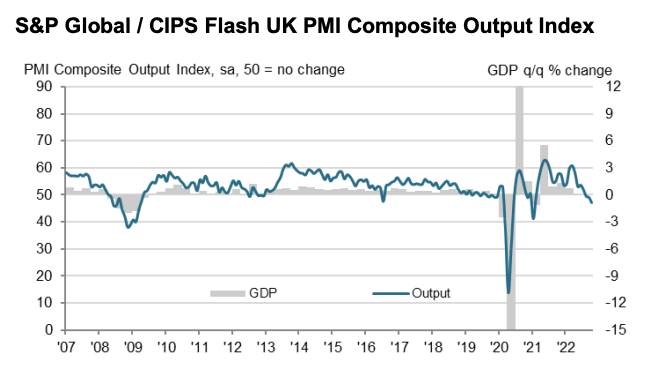UK headed for ‘deep recession’ on political turmoil and soaring interest rates

The UK could be hurtling toward a “deep recession” caused by a mixture of political turmoil and soaring prices forcing the Bank of England to hike interest rates steeply, a closely watched survey out today reveals.
Britain’s private sector economy shrank sharply this month, with contraction rates returning to levels last seen in January 2021 when the country was in the teeth of the longest Covid-19 lockdown.
The S&P Global and Chartered Institute for Procurement and Supply’s (CIPS) composite flash purchasing managers’ index (PMI) for October slid to 47.2 from 49.1 in September.
The fall means the PMI has dropped below the 50 point threshold that separates growth and contraction.
Services firms, which generate around two thirds of the UK’s economic output, are suffering badly from consumers cutting spending in response to soaring inflation eroding their finances.
The services PMI fell to 47.5 from 50, driven by ”squeezed household budgets, recession concerns and delayed business investment decisions due to political uncertainty,” the survey said.

Inflation is running at a 40-year high of 10.1 per cent, meaning prices are racing ahead of pay growth.
UK manufacturers are being hit by ongoing supply chain snarl ups forcing them to cut production. The PMI for the sector tumbled to 45.8 in October from 48.4.
Both the services and manufacturing PMI came in far below the City’s forecasts.
Analysts said the political turmoil triggered by former prime minister Liz Truss’s mini-budget has depressed the economy and the resulting Tory leadership contest after she was forced to quit Number 10.
“While the economic downturn has led to reduced upward pressure on prices, the weak pound and high energy costs meant that input cost inflation remains higher than at any time in the survey’s history prior to the pandemic,” Chris Williamson, chief business economist at S&P Global Market Intelligence, said.
“The resulting elevated, albeit easing, price pressures look set to drive the Bank of England into further aggressive interest rate hikes. On top of the collapse in political stability, financial market stress and slump in confidence, these higher borrowing costs will add to speculation of a worryingly deep UK recession,” he added.
Truss U-turned on nearly everything in the £45bn tax cutting mini-budget, delivered on 23 September, to tame UK financial market stress, meaning “fiscal policy now look set to weigh on households’ real disposable income,” Samuel Tombs, chief UK economist at Pantheon Macroeconomics, said.
Tombs added worsening household finances will plunge the UK into a “protracted recession”.
Others said the weakening UK economy, coupled with the PMI signalling firms are reining in passing higher costs on to consumers, suggests the Bank will opt for a 75 rather than a whole percentage point rate hike at its meeting next Thursday.
“More evidence of economic weakness, combined with signs of less heated inflationary pressures, should, all else equal, tone down the MPC’s appetite to raise interest rates substantially in its November meeting,” Martin Beck, chief economic adviser to the EY Item Club, said.
The Eurozone PMI also signalled the bloc is headed for a sharp slowdown. It fell to 47.1 from 48.1, dragged lower by Germany notching a flimsy 44.1 reading.